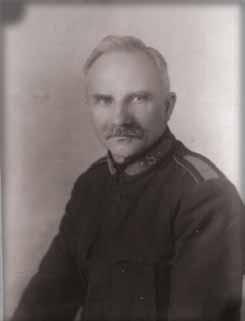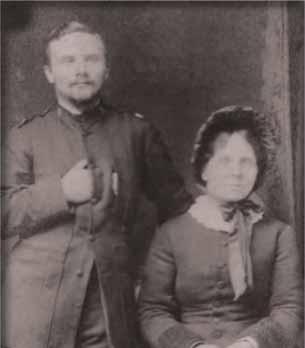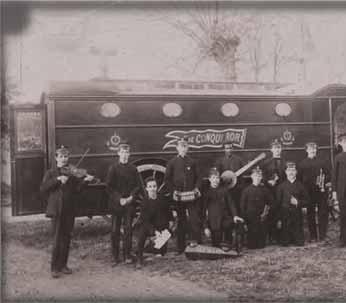
5 minute read
Steadfast and unwavering
In the first of a series of previously published articles, Major Katrina Thomas delves into family history to discover more about Major Darrell Thomas’s great-grandfather

BORN in 1870 in Wellington, Somerset, to parents who were ardent workers in the Methodist Church, Frederick Walter Taylor was still young when the family moved to Cardiff, where he was soon attracted to the newly formed Salvation Army. Fred was a bright boy who did well at school, leaving early to become a clerk in a shipping office. All went well and his future looked assured, but God had other plans for this young man and in response to a ‘divine niggle’ he offered himself to The Salvation Army for service.
Fred became an officer in 1884 at the age of 14! He served for a brief period as a shorthand scribe to Commissioner William Risdel and, until 1892, served in divisional headquarters appointments.
In April 1887 Captain Fred received a telegram: TAYLOR, NORTHAMPTON HQ. PROCEED TO HITCHIN UNTIL FURTHER ORDERS.
The following extract from his journal, which is now in the possession of his great-grandson Major Darrell Thomas, gives a glimpse of the character and times of this extraordinary man.
‘How rarely do we realise the greatness of little things. A few words, a telegram may change our course in life and alter our eternal destiny… Packing a few things, I proceeded to my appointment and found on arrival a sick captain and several young men cadets housed in a caravan bearing the warlike title ‘Victory’… The cadets, led on by their captain, spent their mornings in study, their afternoons in visitation and War Cry selling and evenings assisting in conducting salvation meetings, real practical training for the days of officership to come…

St Albans County Gaol
‘No corps existed in the town of Hitchin at this time… Seventy converts met in the old barn in Ickleford and what an interesting place this was! Earthen floors, rough forms without backs, well ventilated – for rain often came through the leaky roof – but the Glory also filled the place and in the barn many precious souls were born again! These were indeed wonderful times.
‘The open-air meeting in Hitchin market place was a great attraction. The cadets and converts led by their captain, who played the cornet, drew a large crowd of all sorts of conditions of men. The “Army” was often misunderstood. Sticks, stones, filth of all sorts, rotten eggs, soot, flour were the everyday experience of our comrades. Broken limbs, cuts, bruises, black eyes were common occurrences. But the Salvationists gloried in their persecution and triumphed in their conflicts. As the dark evenings approached, the rough element caused increased trouble by trying to break up the open-air meetings, but in spite of this we never discontinued them… we linked arms and stood our ground as long as possible to keep the meeting going…
‘Saturday 13 December was an eventful day… that evening the roughs were exceptionally unruly and it seemed clear that they meant to do all the harm possible. Just as things were at their worst a police sergeant accosted me, charging me with obstruction.
A summons was served to appear the following day to answer the charge…
‘That evening I was seated in my quarters. My Bible was on the table. Well, all is in order… what a strange experience… I wonder what will happen tomorrow! I wish I knew without a doubt what course I ought to take. If I am fined I shall refuse to pay and the alternative will be imprisonment. I don’t think a few days in prison will injure me but will it be best for God’s work and the Army? I opened my Bible and read: “Do not be afraid, keep on speaking, do not be silent. For I am with you and no one is going to attack or harm you’’ (Acts 18:9 and 10).
‘The next morning I was at the court in good time. Much was said and at last the magistrate passed the sentence of a fine of five shillings or seven days.’
Everyone expected the captain to pay. It was such a small amount but it was explained that his refusal to pay was on principle; so, bidding goodbye to his people, Captain Fred was escorted below to be conveyed to St Albans County Gaol.

Young Fred with his mother
The police sergeant joined Fred with anxiety in his words: ‘Why aren’t you going to pay the fine? I’ll give you three shillings towards it,’ he said. His conscience was evidently smitten, but Fred still refused.
‘I did what every SA officer does when entering his new quarters – I surveyed my new surroundings! A plank bed, blanket, table, stool, tin cup, plate and spoon. I received eight ounces of bread for breakfast and supper. Dinner was six ounces of gruel. My employment was making rope and each night I heard the music of St Albans SA Band being played outside the walls…
On the day of my release I was met by the officers and comrades of St Albans Corps. They gave me a good breakfast and a few days later I returned to Hitchin; I was on the crest of a wave!’
Major Fred was transferred to International Headquarters in 1900. In 1923 he entered a new phase of fascinating experience. As private secretary to Commissioner David Lamb, Major Fred travelled to many countries and when The Salvation Army chartered the SS Vedic to take emigrants to Australia and New Zealand, he was appointed as welfare officer for the voyage.
Major Fred’s busy life did not prevent him from working as YPSM at Manor Park and Southend Citadel. Throughout his officership Fred remained undaunted by difficult circumstances – a godly man, firm in purpose and unwavering in principle seeking to use every opportunity to testify to others about God’s love and salvation.
Major Fred Taylor was a great believer in the Bible and knew the power of prayer. With a strong faith, he served God and the Army for 74 years as an example of love, honesty, and steadfastness and always strived to help and inspire others.
MAJOR THOMAS LIVES IN RETIREMENT IN WORTHING

This caravan would have been similar to ‘Victory’









